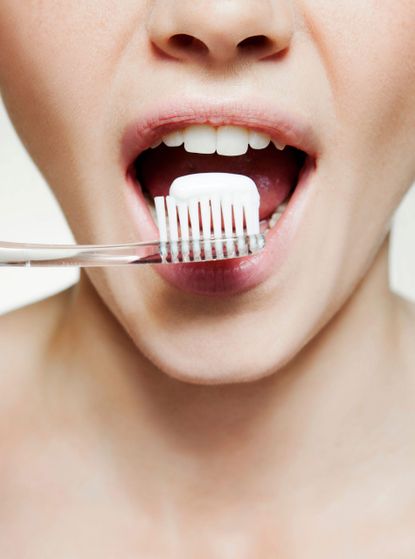The Oral Cancer Symptoms You Should Know About


We are constantly told to check our breasts and look out for the early signs of breast cancer. We know what lifestyle choices can increase the risks of developing skin cancer and when to worry about a mole but have you thought about your oral health?
Mouth cancer, also known as oral cancer, can have very subtle symptoms that could easily be mistaken for something else or ignored.
It affects around 6,800 people in the UK and accounts for 2 per cent of all cancers diagnosed. This probably explains why many people are not as clued up on the signs and symptoms of oral cancer.
The NHS explains that mouth cancer usually occurs when a tumour develops in the lining of the mouth, surface of the tongue, insides of the cheeks or on the lips and gums.
November is mouth cancer awareness month so there is no better time to get clued up on your oral health than now.
There are different types of mouth cancer to look out for. The most common is Squamous cell carcinoma, which accounts for nine out of every 10 cases.
Less common forms of oral cancer can develop from mutations in the salivary glands or abnormalities in the bone, cartilage, muscle or other body tissue.
Sign up for the woman&home newsletter
Sign up to our free daily email for the latest royal and entertainment news, interesting opinion, expert advice on styling and beauty trends, and no-nonsense guides to the health and wellness questions you want answered.
The NHS also lists:
Oral malignant melanomas: The cancer starts in melanocytes, the cells that produce skin pigment; they appear as very dark, mottled swellings that often bleed Lymphomas: These grow from cells normally found in lymph glands, but can also develop in the mouth
Signs Of Mouth Cancer:
Given mouth cancer is much less well known, it is so important to know the signs of it. It can be as simple as getting an unexplained loose tooth checked out or a persistent ulcer.
- Sore mouth ulcers that don't heal within several weeks
- Unexplained persistent lumps in the mouth and neck
- Unexplained looseness in teeth or sockets that don't heal completely following extraction
- Persistent numbness or an odd feeling on the lip or tongue
- Sometimes, white or red patches on the lining of the mouth or tongue - these can be early signs of cancer, so they should also be investigated
- Changes in speech, such as a lisp
According to Mouth Cancer Action 33 per cent of mouth cancer cases are connected to excessive alcohol intake.
Other mouth cancer causes include:
Smoking or using other forms of tobacco
Research indicates that those who drink and smoke at the same time are at a greater risk of developing mouth cancer. Alcohol and tobacco are the two leading causes of oral cancer in the UK.
A poor diet
The NHS states that a poor diet may increase the risks of mouth cancer. Having a healthy balanced diet with lots of fruit and vegetables is thought to reduce the risk.
Chewing betel nuts
Betel nuts are mildly addictive seeds from the betel palm tree. They are commonly used in south-east Asian communities and have a similar effect to coffee, working as a stimulant. However they also have a carcinogenic effect.
Human Papilloma Virus (HPV)
The HPV virus is a group of common viruses, which can cause cervical cancer. All girls from the age of 12 get a free vaccine to prevent infection from HPV.
Regular trips to the dentist can ensure that signs of oral cancer are picked up early on. If you have any concerns it is best to bring them up at your next appointment and keep an eye on anything that doesn't look or feel quite right.
Jessica is a Senior Food Writer at Future and is an enthusiastic, self-taught cook who adores eating out and sharing great food and drink with friends and family. She has completed the Level 1 Associate course at the Academy of Cheese and is continually building on her knowledge of beers, wines and spirits. Jessica writes food and drink related news stories and features, curates product pages, tests and reviews equipment and also develops recipes which she styles on food shoots.
-
 I tried the Spotlight Oral Care Sonic toothbrush - here's why I'll recommend the budget-friendly buy to friends in 2024
I tried the Spotlight Oral Care Sonic toothbrush - here's why I'll recommend the budget-friendly buy to friends in 2024The Spotlight Oral Care Sonic toothbrush offers more for your money than some of the big brands, with 30 to 50,000 brush strokes a minute
By Caramel Quin Published
-
 These are 32 of the best foods to eat before a workout, whatever your gym goals
These are 32 of the best foods to eat before a workout, whatever your gym goalsPower yourself through exercise with the best foods to eat before a workout
By Lauren Clark Published